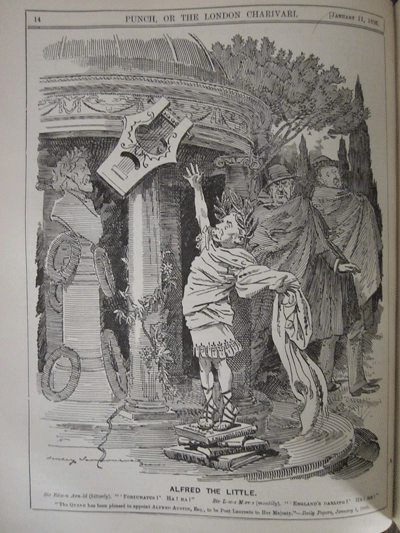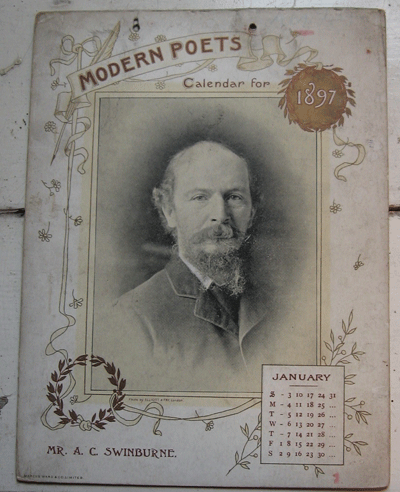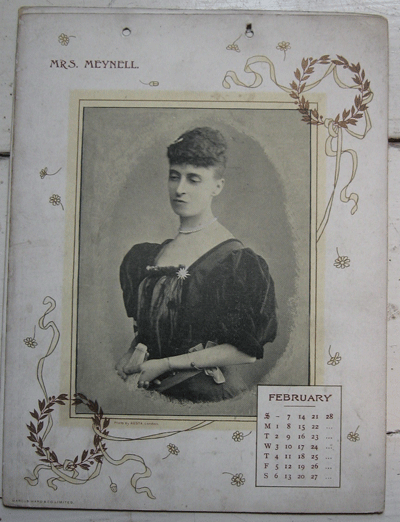Abstract
On 6 October 1892 Alfred, Lord Tennyson, died at Aldworth, his home in Surrey; six days later, the Poet Laureate was buried in Westminster Abbey. This essay explores the controversy in the periodical press that ensued over the appointment of his successor, the debate over whether the office should represent a royal or national appointment, and the aftermath of the choice of Alfred Austin as “Poet Laureate to Her Majesty” in January 1896.
Poets and periodical writers recognized, however, that a laureate was chosen not simply for high literary merit. The office represented an intersection of poetry and politics; it was a royal appointment as “Poet Laureate to Her Majesty” and had traditionally required odes celebrating the monarch and English nation.[1] Earlier in Victoria’s reign, Prince Albert had recommended Alfred Tennyson to his wife based primarily on the quality of In Memoriam, with Lord John Russell, then Prime Minister, acquiescing; now it was assumed that the prime minister would exercise greater control in recommending a candidate to his sovereign. But on what basis? If politics dominated, then the recommendation might be troublesome in the unstable parliamentary conditions of the 1890’s: an aging William Gladstone (Liberal) had returned as prime minister in August 1892, just before Tennyson’s death, but was soon displaced by Lord Rosebery (Liberal) in March 1894 and then by Lord Salisbury (Conservative) in July 1895. Indeed, for both Liberals and Conservatives, the best poets might be disqualified: William Morris as a “Radical of the Radicals” (Yeats et al. 54) and “a preacher of Socialist homilies” (Fortnightly 625) or Algernon Swinburne as the controversial poet of Poems and Ballads, Republican glorifier of risorgimento in Songs before Sunrise (Fortnightly 626), and sympathizer with “violent forms of revolt” (Yeats et al. 54).
Recognizing the difficulty of aligning good poetry with royal politics, several writers in the periodical press urged a shift in the conception of the office to “poet laureate of the nation.” In The Bookman, which commissioned four poets to comment on the laureateship and its future,[2] William Butler Yeats observed: “All the public officers, from the Prime Minister downwards, were once Court officials, but now they are responsible to the nation and to the nation alone. Surely it is time to transform the Laureateship also” (54). Another Bookman commentator, Robert Bridges, noted that Tennyson had held the office of poet laureate particularly well because his “whole method of thought was in harmony with existing institutions”; he represented “the best and most liberal side of English Conservatism” (54). But this situation no longer pertained: “No younger English poet could honestly see life from the same standpoint” (54). So various alternatives were suggested: (1) detach the laureateship from the Court (Yeats et al. 53); (2) eliminate the title “the laureate” but grant the honorific laureates to distinguished poets (Yeats et al. 55); (3) abolish the position; or (4) retain the office but expect a diminishment in quality. Rejecting the third and accepting the last, the Saturday Review put it this way: “Lovers of poetry would prefer to see a great poet succeeded by a poet; but if this is not to be, we need not feel broken-hearted. There have been infinitely worse laureates than any one who is like to be chosen” (“Laureateship” 436).
Prime Minister Gladstone’s negotiations with potential laureates remain shrouded in mystery. General lore has it that Queen Victoria suggested Swinburne for the office: “I am told that Mr. Swinburne is the best poet in my dominions,” she is reported as saying (Broadus 197), but Gladstone vetoed him “as too archly republican for the post” (Kahan 244). The Oxford Dictionary of National Biography cryptically notes: “In 1892 Gladstone considered Swinburne as a possible candidate for poet laureateship on Tennyson’s death but after correspondence with Lord Acton took his candidacy no further” (Rooksby). Negotiations with William Morris may have proceeded further. According to Fiona MacCarthy in the ODNB, in 1892 Morris “was sounded out discreetly as to whether, if offered the poet laureateship (left vacant by Tennyson’s death), he was likely to accept it.” This honor, like the ![]() Oxford Professorship of Poetry for which he had been nominated in 1877, was “rejected scornfully” (MacCarthy). After the aborted negotiations with Swinburne and Morris, not much more happened during Gladstone’s ministry. Some insiders hinted that, out of respect for Tennyson’s memory, Gladstone delayed the search for a replacement. Others claimed that he “wandered about hopelessly . . . imploring aid in making up his mind” (Broadus 201-2).[3]
Oxford Professorship of Poetry for which he had been nominated in 1877, was “rejected scornfully” (MacCarthy). After the aborted negotiations with Swinburne and Morris, not much more happened during Gladstone’s ministry. Some insiders hinted that, out of respect for Tennyson’s memory, Gladstone delayed the search for a replacement. Others claimed that he “wandered about hopelessly . . . imploring aid in making up his mind” (Broadus 201-2).[3]
Unofficially, the competition for the laureateship heated up. By August 1893, Andrew Lang was commenting in his Longman’s Magazine column, “At the Sign of the Ship,” that “it would be well if Mr. Gladstone could make up his mind speedily” because “in this long interregnum, the manhood of the country is being sapped by everlasting Odes” (390). Every royal “burial, birth, or bridal” produces a spate of “Dirges, Natal Odes, Epithalmia,” and only when a laureate is appointed will these “authors of odes cease firing” (391). Lang humorously registers a sense that poets were now competing for the laureateship by showing their competence in the required form and that the British public was getting in on the act by judging their performances. American admirers of Jean Ingelow sent Queen Victoria a petition supporting the appointment of a first female laureate. T. P.’s Weekly, a workingman’s paper, held a voting contest for the laureateship in which Rudyard Kipling came in first and Alice Meynell second (Meynell 15). In January 1894 the periodical Fun aired a letter from “An Unemployed Poet” who proposed that “the vacant office of Poet Laureate should be in the gift of the London County Council” and that the poet chosen should “publish an affidavit . . . that he always paid his typewriter the trade union rate of wages” (10). The lack of a poet laureate was becoming a matter for jest.
Three years after Tennyson’s death, the laureateship remained unfilled. In June 1895, however, soon after the Conservative electoral victory, Lord Salisbury as prime minister moved to fill the vacancy. Clement Scott in The Idler took up the pro-Swinburne cause: “I care not if he be a persona grata or not at Court; it does not matter to me one fig if he has underwritten his fierce democratic and republican elegies with baby drivels and sonnets to pettitoes. This has nothing to do with it. . . . I should vote for the poet greatest in England after Tennyson and Browning” (413). But Lord Salisbury let it be known that he was considering the appointment of a journalist—as a compliment to that modern literary profession. Some poets were outraged, but Coventry Patmore used the rumor to nominate a woman writer who had excelled as both journalist and poet, Alice Meynell:
A rumour is being circulated, through the Press and otherwise, that Lord Salisbury has expressed his intention of “complimenting journalism” by selecting the Laureate from its ranks. I wonder whether it has occurred to Lord Salisbury that it would be possible, at the same time, to pay a compliment to poetry. . . . It seems to me there is one writer only in whose person the double compliment could be united. (548)
Obviously, Lord Salisbury thought otherwise because, in November 1895, the Bookman opened its “News Notes” column with this tidbit: “We are informed, on what appears to be reliable authority, that Mr. Alfred Austin has been appointed Poet Laureate, and that the formal announcement may be expected about the middle of this month” (45). Austin, known as a poet for his idyllic English Lyrics, was better known for his journalistic work as a leader writer for the National Review and pro-conservative editor of The Standard (Broadus 203).
1 January 1896: The Bookman was right about the man, though wrong about the date of the appointment. “With the New Year’s Honours comes the official announcement that ‘Her Majesty has been pleased to appoint Alfred Austin, Esq., to be Poet Laureate to Her Majesty’”—so reads the announcement in the Academy magazine’s “News and Notes” (11). It was clear that the choice of Austin depended on his friendship with Lord Salisbury, his past work as a pro-conservative journalist, and his willingness to use poetry to support the government (Broadus 203; Scheuerle). The deeply political nature of his appointment produced a chorus of complaints: that Austin was a literary mediocrity; that he had written disrespectfully of Tennyson as a “namby-pamby” (Austin 9), a poet who lacked manly power and failed to present models of grandeur and greatness to his readership; and, perhaps worst of all, that the nation would now be subjected to endless political versifying:Lord Salisbury has added a new terror to life. Here is the Poet Laureate earning his butt of sherry by writing verses on Dr. Jameson and his raiders [a South African misadventure] and publishing them in the Times. Are we to expect for the future that every interesting event in the national life—a royal christening or a battle—is to be honoured in this way? (‘Mere Outsider’ 63)
After reading a few more of Austin’s official verses, the general conclusion was—“A little of Tennyson and a great deal of water” (‘Literature, etc.’ 139). The satirical magazine Punch registered the downgrading of the laureateship with a large-cut plate, “Alfred the Little,” visually comparing Alfred Tennyson with his successor. (See Fig. 2.)
Austin had his supporters—or, at least, his well-wishers—who sighed with relief that the laureateship was finally in the hands of a poet who would “fulfil its duties admirably” (“Literary Looker-On” 268). No doubt, they saw Queen Victoria’s Diamond Jubilee on the horizon and realized that an official poet was needed to commemorate the event. Some of Austin’s admirers praised his “spontaneous” lyrics that “breathe the air of English rural life” (Hannigan 252); others his character and love of his country “with an unsophisticated and exuberant pride” (Hodgson 613). The English Illustrated Magazine ran an engraved portrait of the poet and his country house, Swinford Old Manor in Kent. (See Figs. 3 and 4.) Periodicals for non-specialist readers, such as Temple Bar and the Wesleyan-Methodist Magazine, published articles about the history of the laureateship, without comment on the quality of the current appointment.The unofficial, often amusing critiques of Alfred Austin as poet laureate came later in the year. Owen Seaman, in The Battle of the Bays (1896), parodied the verse styles of the leading contenders, from Swinburne at the head to Austin in the rear. The Austin parody mocks the journalistic pandering that won “Alfred” the laureateship:
Wrong? Is it wrong? To baser crafts
Has England’s Alfred pandered,
Who once to the sign of Phoebus’s shrine
With awesome gait meandered
And ever wrote in the cause of right
According to his Standard? (Seaman 55)
And it notes the long-winded versifying that was already annoying the public:
A more subtle critique came with the sale of a popular commodity, a “Modern Poets Calendar for 1897,” offered by the firm of Marcus and Ward for the holiday season of 1896-97. The first leaf of the calendar—the month of January—displays the title “Modern Poets,” the year 1897, and a photograph of “Mr. A.C. Swinburne” (Fig. 5). The remaining months alternate male and female poets as follows:What! has the public never heard
In these benighted climes
That nascent note of my Laureate throat,
That fluty fitte of rhymes
Which occupied about a half
A column of the Times? (Seaman 55)
February—Mrs. Alice Meynell (See Fig. 6)
March—Mr. William Morris
April—Mrs. M. L. Woods
May—Sir Lewis Morris
June—“E. Nesbit” (Mrs. H. Bland)
July—William Watson
August—Mrs. K. Tynan Hinkson
September—Mr. Richard Le Gallienne
October—Mrs. Radford
November—Mr. Alfred Austin, Poet Laureate
December—Miss Jean Ingelow
De facto, the Marcus and Ward calendar gives its own ranking of the great poets and tweaks Austin, the laureate, with a low ranking. Swinburne and William Morris had been the leading candidates in 1892 when Tennyson died, and they get pride of place. Other contenders in the interim years were Alice Meynell, Margaret Woods (an academic poet, then wife of the President of Trinity College, Oxford), Lewis Morris, William Watson, and Jean Ingelow. Although the calendar includes Alfred Austin with the label “poet laureate” beneath his name, by virtue of its monthly assignment, it “ranks” him at the bottom, putting Swinburne, Meynell, and William Morris at the forefront of the “modern poets.”[4]
Austin served as Poet Laureate from 1 January 1896 until his death on 2 June 1913. He was succeeded by Robert Bridges, the commentator in The Bookman who had begun his letter: “In answer to the first of your two questions, I beg to say that the continuance or cessation of the Poet Laureateship is to me a matter of complete indifference” (54).
HOW TO CITE THIS BRANCH ENTRY (MLA format)
published June 2012
Peterson, Linda. “On the Appointment of the ‘Poet Laureate to Her Majesty,’ 1892-1896.” BRANCH: Britain, Representation and Nineteenth-Century History. Ed. Dino Franco Felluga. Extension of Romanticism and Victorianism on the Net. Web. [Here, add your last date of access to BRANCH].
WORKS CITED
Austin, Alfred. The Poetry of the Period. London: Richard Bentley, 1870. California Digital Library. Web. 29 April 2012.
Bellamy, C H. “Lives of the Laureates.” Wesleyan-Methodist Magazine 118 (February 1893): 105-13. Periodicals Archive Online. Web. 28 April 2012.
B[ridges], R[obert]. “The Question of the Laureateship.” The Bookman 3 (November 1892): 54. Periodicals Archive Online. Web. 28 April 2012.
Broadus, Edmund Kemper. The Laureateship: A Study of the Office of Poet Laureate in England. Oxford: Clarendon Press, 1921. Print.
Hannigan, D. F. “The New Poet Laureate.” Westminster Review 145 (January 1896): 251-54. Periodicals Archive Online. Web. 28 April 2012.
Hodgson, W. Earl. “Mr. Alfred Austin, Poet Laureate.” English Illustrated Magazine 150 (March 1896): 610-13. Periodicals Archive Online. Web. 28 April 2012.
Kahan, Jeffrey. “Poet Laureate.” The Oxford Encyclopedia of British Literature. Ed. David Scott Kastan. Oxford: Oxford UP, 2006. 241-245. Print.
Lang, Andrew. “At the Sign of the Ship.” Longman’s Magazine 22 (August 1893): 384-92. Periodicals Archive Online. Web. 28 April 2012.
“The Laureateship.” Saturday Review 74 (15 October 1892): 435-36. Periodicals Archive Online. Web. 28 April 2012.
“The Literary Looker-On.” National Observer 15 (11 January 1896): 267-68. Periodicals Archive Online. Web. 28 April 2012.
“Literature, etc.” The Speaker 13 (8 February 1896), 139. Web. Periodicals Archive Online. 28 April 2012.
MacCarthy, Fiona. “Morris, William (1834–1896).” Oxford Dictionary of National Biography. Oxford UP, Oct. 2009. Web. 28 April 2012.
‘A Mere Outsider.’ “This Morning’s Paper.” The Speaker 13 (18 January 1896): 63. Periodicals Archive Online. Web. 28 April 2012.
Meynell, Francis. Catalogue of the Centenary Exhibition of Books, Manuscripts, Letters and Portraits [of Alice Meynell], October 10-November 7, 1947. London, 1947. Print.
Morris, Lewis. The New Rambler: From Desk to Platform. London: Longmans, Green, 1905. Print.
“News Notes.” The Bookman 9 (November 1895): 45. Web. Periodicals Archive Online. 28 April 2012.
“Notes and News.” The Academy 49 (4 January 1896): 11. Periodicals Archive Online. Web. 28 April 2012.
Patmore, Coventry. “The Proposed Compliment to Journalism.” Saturday Review 80 (26 October 1895): 548. Periodicals Archive Online. Web. 28 April 2012.
Peterson. Linda H. “Presenting Alice Meynell: The Book, the Photograph, the Calendar.” Women Writers and the Artifacts of Celebrity in the Long Nineteenth Century. Eds. Ann R. Hawkins and Maura Ives. Farnham: Ashgate Press, 2012. Print.
“The Poet-Laureateship.” Temple Bar 106 (December 1895): 498-516. Periodicals Archive Online. Web. 28 April 2012.
Rooksby, Rikky. “Swinburne, Algernon Charles (1837–1909).” Oxford Dictionary of National Biography. Oxford UP, May 2009. Web. 28 April 2012.
Scheuerle, William H. “Austin, Alfred (1835–1913).” Oxford Dictionary of National Biography. Oxford UP, Jan. 2008. Web. 28 April 2012.
Scott, Clement. “Who Should Be Laureate?” The Idler 7 (Feb. 1895 – July 1895): 413-414.
Seaman Owen. The Battle of the Bays. London: Bodley Head, 1896. Project Gutenberg. Web. 29 April 2012.
“Tennyson: And After?” Fortnightly Review 47 N.S. (May 1890): 621-37. Periodicals Archive Online. Web. 28 April 2012.
‘An Unemployed Poet.’ “The Laureateship-A Suggestion.” Fun 59 (2 January 1894): 10. Periodicals Archive Online. Web. 28 April 2012.
“Who Is To Be the Next Poet Laureate?: Aut Swinburne, Aut Nullus.” Review of Reviews 1:5 (May 1890): 398. Periodicals Archive Online. Web. 28 April 2012.
Witt, Marion. “Yeats on the Poet Laureateship.” Modern Language Notes 66 (June 1961): 385-388. JSTOR. Web. 28 April 2012.
[Yeats, William Butler], et al. “The Question of the Laureateship.” The Bookman 3 (November 1892): 52-55. Print.
ENDNOTES
[1] Prior to Robert Southey’s laureateship (1813-1843), the office required two odes, one for the new year and another for the monarch’s birthday. This practice was suspended during the latter years of George III’s reign when the king went mad, and though Southey claimed that he continued to prepare New Year’s odes, only his first, “Carmen Triumphale, For the Commencement of the Year 1814,” was officially published and performed. Southey’s successor, William Wordsworth, did not compose any official verse; see Broadus, pp. 163-84.
[2] Only one poet signed his contribution, R[obert] B[ridges], in letter III. But we know from a letter Yeats wrote to John O’Leary that he is the author of letter II; see Witt, 385-86.
[3] Lewis Morris, a contender for the laureateship, makes the latter claim in The New Rambler (London, 1905), 107, but he was not alone in thinking that the 83-year-old Gladstone has lost his ability to take action.
[4] For further discussion of this calendar and its link to the Bodley Head poets (including Meynell, Watson, Hinkson, Radford, “E. Nesbit,” and Le Gallienne), see Peterson, 185-86.






